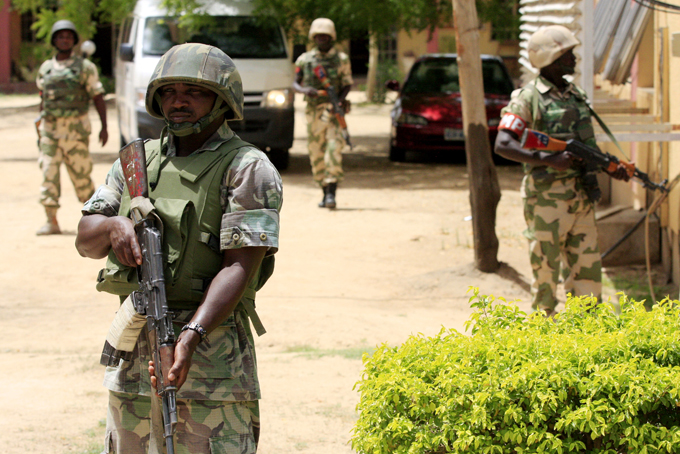
Soldiers stand guard at the offices of the state-run Nigerian Television Authority in Maiduguri, Nigeria, Thursday, June 6, 2013. Maiduguri is the heart of Nigeria’s Islamic insurgency. Military officials took journalists on a tour there Thursday, but largely declined to give specific answers about what’s happening in the country’s fight against the extremists. (AP Photo/Jon Gambrell)
While displaying seized arms and showing journalists an abandoned extremist camp near Marte, about 95 kilometers (60 miles) away from Maiduguri, commanders contradicted themselves on details of fighting. They declined to take journalists to the areas believed to have been targeted by aerial bombing raids. Meanwhile, some acknowledged under questioning that insurgents, including those from the extremist network Boko Haram, likely escaped with heavy weaponry like anti-aircraft guns and remain a serious danger to the region.
In Maiduguri itself Thursday, the military-led convoy journalists took drove past the city’s main hospital, where security forces have dumped bodies and fought with doctors. They also drove past the scene of a retaliatory attack by soldiers in October that saw troops kill more than 30 civilians and burn down blocks of shops and homes, witnesses said. Also never mentioned was the April attack in the fish village of Baga, where witnesses and human rights organizations say soldiers burned neighborhoods and killed at least 187 people.
The military’s suspicion of journalists — especially foreign media — remains a hangover from decades of military rule in a country where simply taking a photograph on the street can still get one detained by police. A journalist with the state-run Nigerian Television Authority at one point asked Olukolade to rate the media’s coverage of the fighting.
“Some (in the media) have negative mindsets — mindsets that there must be some abuses that (have) not been verified,” the brigadier general said. “Particularly from the local media, we’ve got good cooperation.”
That local media cooperation comes in the form of newspapers and broadcasters in Nigeria that largely reprint statements verbatim from military officials. In one case, newspapers provided panting coverage of the discovery of condom wrappers at the extremist camp near Marte. The source: A military news release the day before with the headline “CONDOM EVERYWHERE” that called it a sign of the “dirty sides of the insurgents’ lifestyle.”
A military news release Wednesday highlighted the journalists’ trip, as soldiers shot many photographs and filmed the foreign journalists.
After largely avoiding questions, journalists on the trip cornered Olukolade on Thursday. He said the military “substantially achieved” having no civilian casualties, while also implying soldiers would fire at will when suspicious.
“Anyone that was killed in a camp cannot call himself a civilian. Most of the camps are populated definitely by terrorists,” Olukolade said. “All the forests are being combed. In the course of combing, anyone that we stumble upon (in what) looks like a camp will be destroyed.”
Pressed again about how many extremists the military held in custody, Olukolade said “hundreds” before saying: “I cannot give you specific details.”
The lieutenant colonel over his shoulder waved the interview closed and added: “Gentleman, thank you.”
___
Jon Gambrell can be reached at www.twitter.com/jongambrellAP.